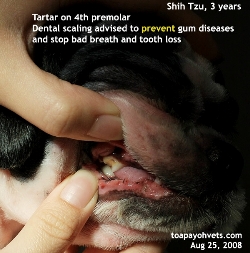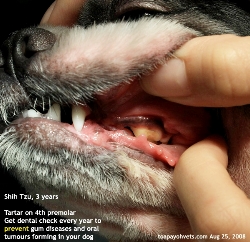DENTAL WORK DONE
BY GROOMERS, PET SHOP
AND PET CAFE OPERATORS IN SINGAPORE
Aug 23, 2008
Dr Sing Kong Yuen, BVMS (Glasgow), MRCVS
1. One day in August 2008, a pet shop girl asked me
while I was vaccinating her puppies: "The AVA (Agri-Food
& Veterinary Authority) is catching those pet shop
operators doing dentistry. Do you know?"
I did not know anything about this. However dog
dentistry is practised by pet shop operators and
groomers for some time. I presume that increasing
rentals by as much as 50 - 100% recently and cut-throat
competition and under pricing by the pet shop operators
have led to some considering new sources of generating
revenue to sustain their profitability.
No doubt, there is a demand for dental work without
"anaesthesia" as the younger internet generation is much
more aware of the need of prevention of diseases to
enable their dogs to live longer.
In the last decade, I note that the baby-booming
generation just feeds the old dog and let his teeth drop
along the years, without bothering about the dog's oral
pain, infection and suffering. The younger
generation is much kinder to pets and much more
concerned about their health and welfare.
2. Here are my brief comments about the practice
of canine dentistry by pet shop and pet cafe operators
and groomers in
Singapore.
2.1 Safety. The owner is concerned that his dog
may die under
general anaesthesia during or before dental
scaling. This is a realistic situation for dog owners.
The anaesthetic and surgery consent forms used by vets
prior to anaesthesia to let owners be aware of the risks
involved is a deterrent factor for many pet owners
seeking dental work/surgery to be done by the vets.
2.2 Cruelty to dogs. Is it cruel to restrain
those dogs who do not want to participate in this
scaling without anaesthesia? Are some
"tranquilisers" used by the non-veterinarians in order
to get the job done?
2.3 Turf Protection. Is the vet trying to protect
his turf if dental work is prohibited by non-vets who
don't use anaesthesia? I presume the non-vets do not do
dental work on uncooperative and biting dogs unless they
give them some tranquilisers.
2.4 Legal aspects. Is dental work done by
non-vets in Singapore considered veterinary practice
and/or illegal in Singapore?
2.5 Economics. From my observations, it is much
cheaper when done by the pet shop people. One pet shop I
know charges $120. I presume the other operators charge
less. Pre-anaesthetic checks, examinations and
blood
tests will be good for pets but many Singapore
owners do not want not pay the additional veterinary
costs. Such tests ought to be done by vets but the extra
costs are unpalatable to many uneducated pet owners.
After all, the older dog looks healthy, can eat and
sleep. Only some
bad breath.
2.6 One strange case. Recently I encountered a
strange case of a 3-year-old dog who had dental scaling
done by a pet cafe operator 2 days ago. The dog passed
fresh blood several times. Was it the dental work, the
food eaten, stress or pre-existing infections of the
intestines - this was hard to say. Parvoviral infection
was not the cause of the haemorrhagic
gastroenteritis.
2.7. Non-vets practising canine dentistry in the U.S.
There are non-vets providing such a service in the U.S
and some may be doing a thriving business using a mobile
van to do house-calls. The internet is a source of such
information. It is easy to buy
dental instruments to do the scaling. There is a
demand for "anaesthesia-free" services and the non-vets
see the demand.
2.8.
Veterinary Dental Health Education. There
seems to be a lack of veterinary
dental
health education in Singapore in general. I note
that many Singapore dog and cat owners do not bother
with their pet's dental health even when their the teeth
drop off. They tolerate the bad breath. Some try dental
gels and specific dental food hoping that the tartar
will disappear. Some see the vet when their pets can't
eat due to oral pain or biting family members who touch
their mouth.
However, some are aware of the need for the non-vets to
strongly restrain their dogs for dental work as not many
dogs want to freely open their mouth for teeth tartar
scraping.
 |
|
Many Singapore
dog owners find that their dog resists their
mouths from being opened for tooth brushing.
|
2.9. Health Education by pet internet forums. Dog
owners share their grief in the internet forums and
badmouth the vets who have had dog deaths under
anaesthesia, spreading more worries to other pet owners.
I have read one such forum recently. Many of those 85
participants in this particular forum want to know the
name of the vet and the practice (to avoid) in a cases
where the writer does not mention names. Death of a pet
under anaesthesia is very traumatic to the owner and
though it is a rare incident, one death is one
too many.
2.10. Relationship of trust. Many Singapore pet
owners are closer to the pet shop operators and groomers
as they have more encounters with them than with the
vets. Therefore, the owners do trust the advice of the
former more when they mention about the rare instances
of anaesthetic deaths suffered by certain customers.
Conclusion, there is a realistic concern about
deaths under anaesthesia by pet owners all over the
world. The internet has given them more knowledge of
dental health but also has frightened some about the
risk of dying under anaesthesia. Even one death out of a
few hundred is one too many when your pet is affected.
So, non-vets offering the alternative without
anaesthesia is much appreciated by pet owners.
As the fees are much lower than those charged by the
vets, economics play a greater part in a time where
food, petrol and other prices in Singapore are on the
rise every week.
Perhaps a canine dental health/education survey amongst
the Singapore pet owners on a regular basis may
be useful. But who will do it?
 |
|
An annual
dental check up is recommended for dogs older than
2 years old. Use a finger brush to clean your
dog's teeth after scaling if your dog fights you
when you use the toothbrush. |
In the final analysis, an educated dog owner who
spends the time to brush the dog's teeth from
puppyhood and who gets an annual dental check up at the
veterinarian will have prevented many of the severe
dental health diseases in their dogs. This means that
their dogs live to a ripe old age without oral pain and
bad breath. Many dog owners just don't have the time or
knowledge to do it.
Nowadays, there are pet transport people who will bring
the dogs for dentistry at the veterinarian. Why not get
the transport people if you don't have the time?
|